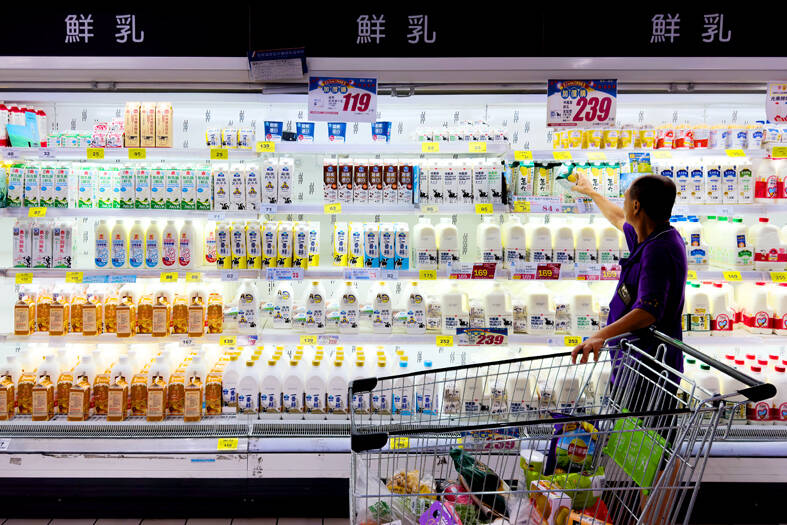The consumer price index (CPI) rose 1.6 percent last month from a year earlier, quickening slightly from July’s 1.54 percent as Typhoon Podul and heavy rainfall drove up food prices, the Directorate-
General of Budget, Accounting and Statistics (DGBAS) said yesterday.
The modest uptick kept inflation below the central bank’s 2 percent threshold for the fourth consecutive month, leaving policymakers room to keep borrowing costs unchanged at their policy meeting on Sept. 18.

Photo: Ritchie B. Tongo, EPA
Food prices, which carry the heaviest weighting in the CPI basket, climbed 3.18 percent from a year earlier, the agency said.
Typhoon-related damage pushed up vegetable costs by 10.9 percent, while pork prices surged more than 8 percent.
Grains rose 3.4 percent and dining-out expenses advanced 3.34 percent, DGBAS official Tsao Chih-hung (曹志弘) said.
Core CPI, a more reliable price tracker that excludes volatile food and energy components, rose 1.74 percent, remaining comfortably within the 2 percent mark and signaling stable underlying price momentum, Tsao said.
Shelter costs advanced 1.8 percent, driven by a 2.29 percent rise in rents and a 5.08 percent gain in household management expenses, the agency’s monthly report showed.
Healthcare costs added 1.75 percent after hospitals raised registration and copayment fees for hospitalization.
Transportation and communication prices fell 1.34 percent, with fuel down 8.56 percent and airfares sliding 5.36 percent. The declines were partly offset by higher train fares and vehicle maintenance expenses, the agency said.
Looking ahead, Tsao said inflationary pressure might ease this month if weather conditions stabilize.
The official also downplayed concerns about potential spillover effects from the 20 percent tariffs the US imposed on Taiwanese goods last month.
“The impact should be limited,” Tsao said, noting that the New Taiwan dollar has appreciated about 7 percent this year, helping to drive import costs lower for the past five months.
Prices of agricultural and industrial raw materials have shown mixed movements, further limiting tariff effects, he said.
At the wholesale level, the producer price index fell 4.98 percent annually last month, dragged down by declines in chemicals, petrochemicals, metals and electronics, the agency said.
However, rising livestock prices and last year’s electricity price hikes helped prevent a steeper fall, Tsao said.
For the first eight months of the year, consumer prices rose an average of 1.83 percent, while producer prices contracted 1.27 percent.
The relative price stability provides a buffer for policymakers, as they balance inflation management with the need to support growth in an economy exposed to slowing global trade and US-China tensions.

Taiwan Semiconductor Manufacturing Co (TSMC, 台積電) secured a record 70.2 percent share of the global foundry business in the second quarter, up from 67.6 percent the previous quarter, and continued widening its lead over second-placed Samsung Electronics Co, TrendForce Corp (集邦科技) said on Monday. TSMC posted US$30.24 billion in sales in the April-to-June period, up 18.5 percent from the previous quarter, driven by major smartphone customers entering their ramp-up cycle and robust demand for artificial intelligence chips, laptops and PCs, which boosted wafer shipments and average selling prices, TrendForce said in a report. Samsung’s sales also grew in the second quarter, up

On Tuesday, US President Donald Trump weighed in on a pressing national issue: The rebranding of a restaurant chain. Last week, Cracker Barrel, a Tennessee company whose nationwide locations lean heavily on a cozy, old-timey aesthetic — “rocking chairs on the porch, a warm fire in the hearth, peg games on the table” — announced it was updating its logo. Uncle Herschel, the man who once appeared next to the letters with a barrel, was gone. It sparked ire on the right, with Donald Trump Jr leading a charge against the rebranding: “WTF is wrong with Cracker Barrel?!” Later, Trump Sr weighed

LIMITED IMPACT: Investor confidence was likely sustained by its relatively small exposure to the Chinese market, as only less advanced chips are made in Nanjing Taiwan Semiconductor Manufacturing Co (TSMC, 台積電) saw its stock price close steady yesterday in a sign that the loss of the validated end user (VEU) status for its Nanjing, China, fab should have a mild impact on the world’s biggest contract chipmaker financially and technologically. Media reports about the waiver loss sent TSMC down 1.29 percent during the early trading session yesterday, but the stock soon regained strength and ended at NT$1,160, unchanged from Tuesday. Investors’ confidence in TSMC was likely built on its relatively small exposure to the Chinese market, as Chinese customers contributed about 9 percent to TSMC’s revenue last

LOOPHOLES: The move is to end a break that was aiding foreign producers without any similar benefit for US manufacturers, the US Department of Commerce said US President Donald Trump’s administration would make it harder for Samsung Electronics Co and SK Hynix Inc to ship critical equipment to their chipmaking operations in China, dealing a potential blow to the companies’ production in the world’s largest semiconductor market. The US Department of Commerce in a notice published on Friday said that it was revoking waivers for Samsung and SK Hynix to use US technologies in their Chinese operations. The companies had been operating in China under regulations that allow them to import chipmaking equipment without applying for a new license each time. The move would revise what is known